八年级英语unit9课件
Unit9 sectionA重要知识点讲解课件人教版八年级英语下册

Jennifer likes to listen to music; so do I.
10.“so + 主语+动词”,这一结构用来表示对上文情况给 予进一步的肯定或确认。
---It was cold yesterday.昨天很冷。 ---So it was.确实是这样。
--- The students study hard.学生们学习很努力。 ---So they do.他们确实很努力。
--- He went to Shanghai yesterday.他昨天去北京了。 ---So he did.他确实去了。
1.— Have you ______ been to Xiamen? — No, ___A_____.
使用这一结构应注意以下几点: 一、注意结构中and 与标点符号的使用。 这一结构是一个完整的倒装句,因此,若前一句用句号,则so 应大写第一个字母。
Jennifer likes to listen to music. So do I.
若前一句用逗号,则so 前须加and,构成并列分句; Jennifer likes to listen to music, and so do I.
当前面的陈述句中有否定词few, little, never, no, nobody, hardly, seldom等词时,其后的简短疑问句应用肯定形式。 He can hardly swim, __ca_n__h_e_?
We have a little water, _d_o__w_e__?
以let’s开头的反义疑问句,简短疑问句部分用shall we;以let us 开头的反义疑问句,简短疑问部分用will you.
Unit9 Section B (3a-Self check)【课件】八年级英语上册(人教版)
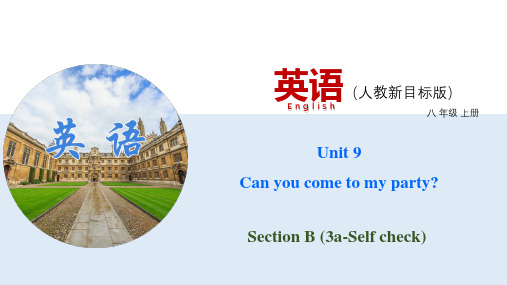
Ending Our names
Dear _________, I would like to _______________________. It will be ____________________________. During the party, you can ______________ ____________________________________. I would also like you to _______________ ____________________________________. I look forward to hearing from you all. __________________
Can you say some words about declining invitations
• I’m sorry, I can’t. I have to… • I’d love to, but I have to… • Sorry, I can’t. I’m going to the movies. • Thanks for your invitation. • Thank you for asking me.
5. Do parents have to bring anything?
They have to bring one book as a gift for the new library.
6. How should people reply to this invitation, and when?
Sample writing
Dear parents,
Unit9SectionB课件人教版英语八年级下册
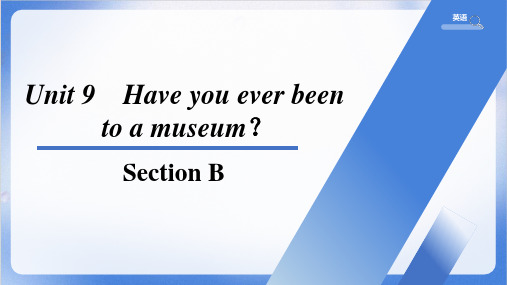
A.wake up me
B.wakes me up
C.wake me up
D.to wake up me
( D )5.Three fifths of the students in our school
boys.
A.be
B.am
C.is
D.are
-返回目录-
二、用所给单词的适当形式填空。
1.Linda has been (be) to the aquarium three times.
3.Can you find a lot of Chinese food there? 3.Yes,I / we can.
-返回目录-
4.What is the night zoo named? 4.The Night Safari.
5.How is the temperature in Singapore? 5.It is almost the same all year round.
她一方面教英语,另一方面学习汉语。
-返回目录-
(2)three quarters是分数3/4的英文表达法。分数是由基数词和序数词 一起构成的。基数词作分子,序数词作分母,分子大于1时,序数词 要用复数形式。如: 3/4: three fourths 或者three quarters 1/3: one third或者 a third 2/3: two thirds 注意:当分数引导短语作主语时,谓语动词用单数还是复数取决于of 后面的名词,即与分数所修饰的名词保持一致。
whether还可意为“是否”,常引导宾语从句,此时可与if互换。如: I don’t know if / whether he is satisfied with my work.我不知道他对我的工作 是否满意。
人教英语八年级上Unit9 课件(共126张PPT)
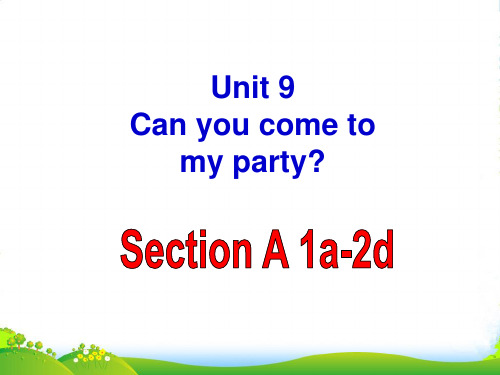
Nick: I’d love to come, but I’m afraid I can’t. I have an exam on Monday so I must prepare for it.
Jeff: That’s really too bad! Oh, but Sam isn’t leaving until next Wednesday. Can you hang out with us on Monday night?
Unit 9 Can you come to
my party?
A: Can you swim? B: Yes, I can. /No, I can’t.
A: Can you play football? B: Yes, I can. /No, I can’t.
Can you come to my party?
Why can’t she come to the party? She has to visit her grandpa.
Why can’t they come to the party? They are going to a concert.
Language Goals: Make invitations Decline invitations Accept invitations Talk about obligations
B:I’m sorry. I’m going to the movies.
Why can’t you come to the party? I have to study for a test.
I have a piano lesson.
I’m going to the movies.
人教版八年级英语上册Unit 9 Section B 1a-1f 课件
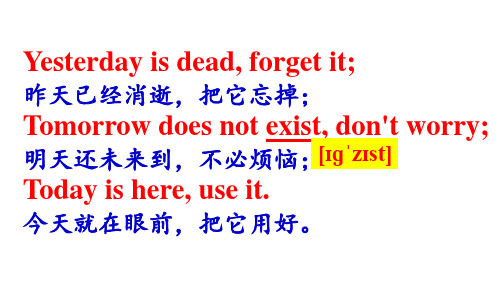
培养学生运用所学语言进行对话,高特定情境下的交际能力。
Pre-class Test
根据汉语意思,写出相应的英文短语。
1.为……做准备 prepare for 2.去看医生 go to the/a doctor 3.患流感 have the flu 4.去参加聚会 go to the party 5.其他时间;别的时间 another time
1. 掌握本课单词与重点短语,复习掌握有关日期的问答对话,能够运用词汇描述日期和时间。 2. 能够通过寻找关键词, 获取听力主要信息,提高听力理解能力及策略运用能力,学会 制作自己的日程表,能运用目标词汇有条理的描述日程计划。 3. 能以角色扮演的形式,用正确的语音语调运用所学句型进行对话。 ➢ Emotional objectives:
Can you have a try?
October the thirty-first the thirty-first of October
May the eighteenth the eighteenth of May
August the second the second of August
Revision
Pre-listening Look and fill.
—Can you come to my party? —I’m sorry, I can’t. I have to _p_r_e_p_a_r_e_f_o_r_a_n__ex_a_m__.
—Can you come to my party? —I’m afraid not. I _h_a_v_e_t_h_e__fl_u__.
人教版英语八年级上册Unit 9 Section A (1a-2d) 课件(共43张PPT)

PaTyraantstelantteiotnhetoexthperefsosllioownisnignteoxpCrheisnseisoen!s!
发出邀请 去看医生
见我的朋友
接受邀请
为考试做准备
得了流感
拒绝邀请:(可附加不去的原因) • I'm sorry, I can't. I have to… • Oh,no,I can't. I might have to… • Sorry, I must… • I can’t either. I…
Of course I can
Sorry, I am not available/free.
It’s my pleasure!
1c
You are the students in the picture. Student A, invite three students to your party. Student B,
抱歉,我不能来,我得为考试做准备
How to make an invitation? • Can you come to my birthday? • Could you come to my school?
How to accept an invitation? • Yes/Certainly/Sure, I’d love / like to.
Can you…
A:CAAa: nC:CyCaaonanunyycoyoouomuupgelcaotoyomtotmeetnyhtnoepimsar?yatylpl??arty? B:IB’mB: S:IsuS’omrurerr,seyIo,’.IdrI’rdlhyoa.lvovIev’emettoot.goho. einlpg mtoythmeommo.vies.
人教版八年级英语上册Unit 9 Section A1a-2c课件
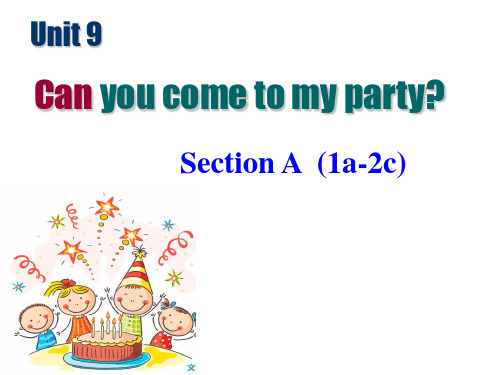
Unit 9
Section A (1a-2c)
Learning goals: Learn how to make, accept and turn down the invitation.学会发出邀请,接受邀请和如何委婉拒绝别人的邀请。
invite
play basketball
climb mountains
go shopping
Colorful weekend Activities
What do you often do on weekends?
help my parents with housework
Free talk
help sb. (to) do sth.help sb. with sth.
1. can 是_____动词, 可以表示_____, _____ 或_____,在本单元中表示______。 can 没有______ 和________ 的变化,其否定形式是________。当用can来向别人发出邀请时,要用一般疑问句形式,其句式为______________________________.接受邀请时:谢绝邀请时:
study for a test
What will you do on weekends?
Words and phrases
prepareprepare forexamfluavailableanother time
v.使做好准备;把……准备好为……做准备 n.考试 n.流感 adj.有空的;可获得的 其他时间;别的时间
play the piano
visit grandparents
Colorful weekend Activities
人教版八年级英语下 Unit 9 Section B (1a-2e) 课件

Army?
1c
Listen again and take notes.
Name: ____________P_e_t_e_r______________ Country: _______A_u_s_t_r_a_l_i_a_____________ How long in China: ___t_w_o__w_e_e_k_s_________ Places visited:t_h_e_P_a_l_a_c_e__M_u_s_e_u_m_,________ he G_r_e_at__W_a_l_l_,__t_h_e_B_i_r_d_’_s__N_es_t_,__t_he__T_e_r_ra_c_o_t_ta_ Arm Food: _________B_e_i_j_i_n_g__D_u_c_k___________
To learn new words: thousand, safe, simply, fear, whether, Indian, Japanese, fox, whenever, spring, mostly…
温故知 新
Complete the sentences. 1. 她已经去火车站接她朋友了。
Shheas__g_on_e___ to the train station to
meet her friend. 2. 谢谢你所做的一切。 have done
Thanks for all that you ____
3. 我很久没有看到你了。
Iha_v_e_n_’__t_ ____ you for a long tsiemeen.
you'll find a lot of food from China; you wont have any problem getting rice, n精o彩o的dl,e优s秀o的r dumplings. Singapore is also an excellent place to try new food. Whether you like Indian foo也d许,你W会es担t心er人n在国外 food or Japanese food, you’找不ll到可fi以n吃d的i东t西。
- 1、下载文档前请自行甄别文档内容的完整性,平台不提供额外的编辑、内容补充、找答案等附加服务。
- 2、"仅部分预览"的文档,不可在线预览部分如存在完整性等问题,可反馈申请退款(可完整预览的文档不适用该条件!)。
- 3、如文档侵犯您的权益,请联系客服反馈,我们会尽快为您处理(人工客服工作时间:9:00-18:30)。
八年级英语unit9课件八年级英语unit9课件Unit 9 Have you ever been to a museum?教材解读本单元的话题是谈论好玩的地方,使学生在此语境下继续学习现在完成时以及本单元的目标语言。
Section B 部分的话题则拓展到旅游景点,通过更加丰富的材料来学习been、ever和never 的用法,最后通过写作达到笔头落实的目的。
单元目标一、知识与技能1. 会用现在完成时谈论过去的经历。
2. 正确使用现在完成时表示是否曾经去过某地或曾经做过某事。
3. Master some important words and phrases:camera,unbelievable; progress; rapid; unsual; toilet,encourage; social,peaceful,a couple of,thousands of,on the one hand…on the other hand,all year ound.4. Improve the listening,speaking,reading and writing ability.二、过程与方法1. 采用直观教学法、情景教学法、讨论、角色表演等方法,学习知识,培养能力,养成好习惯。
2. 通过上下文、词性和构词法等分析词义。
三、情感态度与价值观To be interested in taking part in all kinds of activities in English class,以及了解各类博物馆、主题公园和名胜古迹教法导航采用直观教学法,情景教学法,遵循以学生为主体的原则。
学法导航采用自主学习、小组合作、分角色表演等学习策略。
课时支配第1课时:Section A 1a-2d第2课时:Section A 3a-4c第3课时:Section B 1a-2e第4课时:Section B 3a-Self Check课时教案第1课时 Section A 1a-2d教学目标一、知识与技能1. Key vocabulary:amusement; neither.2. Listening practice.3. Target language:Lets’ go somewhere different today.Have you ever been to…? Yes,I have./ No,I haven’t.How about/what about…?How are we going to get there?We can take the subway/…4. To train students’ listening and speaking skills.二、过程与方法采用直观教学法,情景教学法,小组讨论与交流来认识并掌握目标语言。
三、情感态度与价值观To be interested in taking part in all kinds of activities in English class.教学重点1. Key vocabulary in this period.2. Target language in this period.教学难点Make conversations freely using the target language.教法导航1. Scene teaching method.2. Listening and speaking methods.学法导航Pair work.教学准备多媒体。
教学过程Step 1 GreetingsGreet the students as usual.Step 2 Lead-in1. Guess the places of the pictures; they are the British Museum,space museum,history museum,water park,zoo,amusement park while leading in sentence patterns:“Have you ever been to …?”2. SpeakingGet students to work in pairs to practice the conversation:“Have you ever been to…”“Yes,I have”/ Not,I haven’t.Step 3 Pre-listening1. Section A 1aT:OK. Now open your books on Page 65. In Part 1a,6 places are given. Please read the names of these places. Which of these places would you like to visit? Rank them from 1 to 6.S1:Amusement park ______,water park ______,zoo ______ art museum ______ space museum ______, history museum .S2:Space museum ______,art museum ______,zoo ______,water park ______, amusement park ______, history museum .S3:…2. Talk about the pictureStep 4 ListeningListen and choose the best answer.Listen and check the boxes. Have these students ever been to these places?Step 5 SpeakingAsk and answer in pairs:A:let’s go somewhere different today.B:OK. Where do you want to go?A:Have you ever been to the space museum?B:No,I haven’t. How about you?A:…Step 6 Listening 2a 2b1.Listen and circle the places that you hear.(首先让学生浏览图片,明确题目要求)2.Listen again and circle T for true or F for false.Conversation 11. Tina went to the space museum last year. T/F2. John has never been to the space museum. T/F3. They are going to take the subway. T/FConversation 21. Linda has been to the amusement park. T/F2. Linda went to the amusement park yesterday. T/F3. Linda is going to the amusement park again by bike. T/FConversation 31. Frank had a great time at the water park. T/F2. Frank’s friend has never been to the water park. T/F3. Frank and his friend are going skating. T/FAnswer:T F T T F T F T TStep 2 Pair Work1. SpeakingLook at the map in 2a and make conversations about the places.A:Have you ever been to the space museum?B:Yes,I have. How about you?A:No,I haven’t.B:Oh,it’s fantastic. Let’s go tomorrow.A:OK. How are we going to get there?B:We can take the subway.Give the students a few minutes to practice the conversation and let a few pairs to present their conversations.2. SpeakingRole-play the conversation in 2d.A:I went to the film museum last weekend. Have you ever been there? …B:Yes,I have. I went there back in April. …If they have difficulty,the teacher can help them deal with the difficult points.课堂作业Practice the conversation by themselves.教学反思本节课一定要充分利用课本上的对话交流环节,使目标语言在交际中得以运用和巩固,这样有利于培养学生的综合能力。
第2课时 Section A 3a-4c教学目标一、知识与技能1. 掌握重点词汇和短语:unbelievable,progress,rapid,unusual,toilet,encourage,social,peaceful,performance,perfect,itself,collect.2. Learn to use the present perfect tense.3. To train students’ reading ability4. To get students know some knowledge about many kinds of museums.二、过程与方法1. Explanation method.2. Reading for comprehension.3. Exercise methods.三、情感态度与价值观To raise students’ interest of learning English.教学重点1. 掌握重点词汇和短语:unbelievable,progress,rapid,unusual,toilet,encourage,social,peaceful,performance,perfect,itself,collect.2. Learn to use the present perfect tense.3. To train students’ reading ability.4. To get students know some knowledge about many kinds of museums.教学难点To understand and use the present perfect tense.教法导航创设情景,为学生营造一个尽量真实的语言环境,鼓励他们多阅读,多思考。
